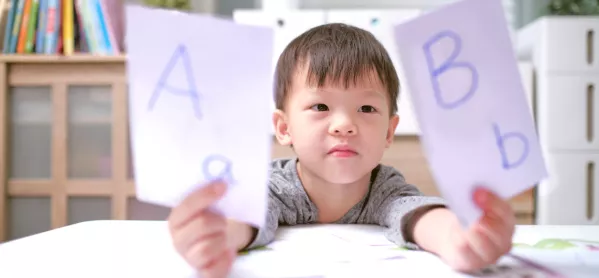The “Letters and Sounds” handbook used to teach phonics in primary schools is “not fit for purpose” and will no longer be a “validated” programme from 2022, the government has said.
Last month, the Department for Education said the 2007 handbook had never been a “full” systematic synthetics phonics (SSP) programme.
The handbook relies on schools themselves “building a programme” around the framework, and does not provide the necessary guidance and support for many of those who “want or need to improve their practice”, the DfE said.
Ofsted: Pupils ‘lost’ to ‘legacy of poor phonics teaching’
Covid: Summer 2021 phonics check cancelled
Exclusive: DfE won’t rule out 2021 autumn phonics check
Now, in a new blog, the department has given further details about why and when “Letters and Sounds” will be removed from the government website and scrapped from its list of validated teaching programmes.
‘Letters and Sounds’ phonics ‘doesn’t provide the support needed’
In answer to the question: “What’s changed - is there something wrong with ‘Letters and Sounds’ 2007?”, the DfE said the handbook “isn’t a full SSP programme because it doesn’t provide the support, guidance, resources or training needed”.
“It relies on schools building a programme of resources around the handbook and, in many cases, updating the progression to bring it in line with current best practice,” it added.
The handbook will remain on the validated list until Spring 2022, which the DfE said “gives schools using it time to consider their approach”.
The department clarified that schools do not have to stop using the 2007 handbook to inform their practice “now, or at all” - as there is no obligation to follow one of the government’s validated programmes.
It added that Ofsted does “not have a preferred programme or approach”.
The only exception to this rule is if schools are receiving support from an English Hub. In this case, they “must follow a programme from the validated list”, it said.
However, the DfE “recommends” that schools consider a validated programme, as these “will have met robust criteria and will have been tested and assessed to be of high-quality”.
“After Spring 2022, schools wanting or needing to improve their practice will be strongly encouraged to use an SSP programme from the validated list, although this will not be mandatory,” it said.
The DfE previously said that schools were welcome to create a full SSP programme based on the 2007 handbook, and submit it for validation.
However, while the handbook’s name is not trademarked, the DfE said it had an “interest” in “ensuring that no one claims or gives the impression that their ‘Letters and Sounds’ is somehow official or endorsed by the Department for Education”.
“Therefore, anyone wishing to submit their programme for validation may use the name ‘Letters and Sounds’, but must preface this with either the name of the organisation, the individual producing their version of the programme or another distinguishing descriptor; for example, John Smith’s ‘Letters and Sounds’,” it said.
“This also allows for schools to differentiate between programmes.”





